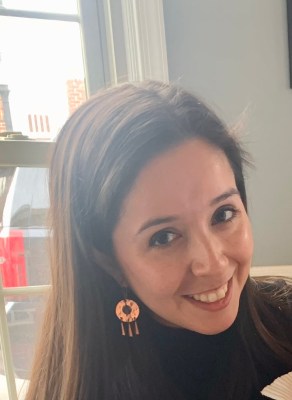Watch the video
Doulas are trained professionals who provide physical, emotional, cultural, and educational support in their communities. Without federal protections for abortion, many states have enacted both criminal and civil penalties for those who receive an abortion or those who provide care. For instance, some states have authorized and weaponized the general public as a mechanism to punish people who seek, receive, and provide abortion care through “bounty hunter” provisions, which can include fines and fees, jail time, and other penalties. Liz Bastias-Butler, a doula who works at one the only clinics in the country that provides abortions after 22 weeks, said she sees these laws’ grave impacts on patients who must travel to receive care. These bounty hunter laws and notification laws instill fear into patients and diminish trust between patients and those around them, including providers and family. As a doula, Liz provides emotional support and reassurance to her patients in a time of such uncertainty and fear.

Liz Bastias-Butler is pictured in January 2020. (Photo credit: Liz Bastias-Butler)
Liz Bastias-Butler is a full-spectrum doula—a person who provides care and support to a person at all stages of pregnancy—and director of clinical services at a clinic in Washington, D.C. To Liz, being an abortion doula means providing support for pregnant people exercising their reproductive choice, including by allowing them to feel seen and heard, providing space for their experiences, and reassuring them that they are not alone in that moment. Liz describes being a doula as providing patient-centered care and unconditional love one patient at a time.
As one of four clinics in the country that sees patients through all trimesters of pregnancy, Liz’s clinic is often the last stop for patients seeking termination after 22 weeks. As more states limit access to abortion, Liz said she sees an increasing number of patients traveling from states with abortion restrictions in place, such as Texas, Tennessee, and Kentucky, to access care. Many are patients presenting with fetal anomalies who previously would have been allowed to receive care in those states. However, because abortion care and miscarriage care often require the same procedures and medication management, providers are sometimes uncertain if they are permitted to provide in those states under certain abortion bans. Liz said what troubles her most is seeing patients who should have been able to get an abortion much earlier but are subjected to unnecessary trauma because recent legal changes outside their control have delayed their care by several weeks. Her patients often travel across the country and spend at least two days in a place far from home, dealing with an emotionally and physically taxing medical procedure. Liz noted that an increasing number of her patients are concerned about legislation such as bounty hunter or vigilante laws that embolden people to report those seeking an abortion. Patients are terrified to leave a paper trail, worried that their loved ones may get in trouble, and scared to reach out for help.
There’s a heightened fear around notification or vigilante laws. It's especially hard for second-trimester patients who are terminating for fetal anomalies. … To fear that their family and friends and community would be at risk creates a lot of isolation for people already grieving a wanted pregnancy.
Liz Bastias-Butler
Seeking an abortion at any stage should not be an isolating experience, and yet many of the patients Liz sees endure just that. Doulas like Liz can help mitigate this challenge, but protective abortion policies are needed so that Americans don’t have to travel far from home to receive care.
Read more health care professionals' stories on caring for patients without the constitutional right to abortion
Doctors, doulas, and nurse practitioners detail their experiences since the overturn of Roe v. Wade and their fears in the rapidly evolving legal landscape of abortion care.